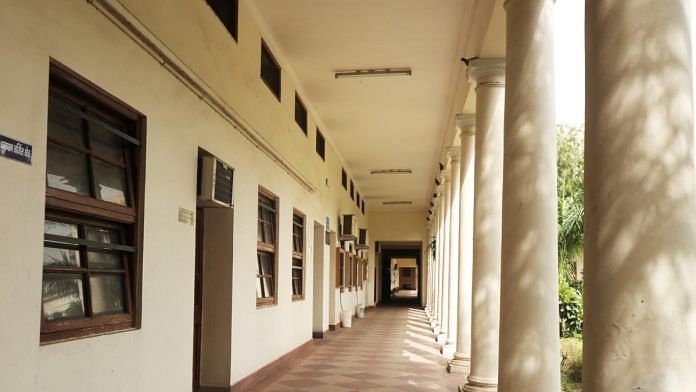New Delhi: Swachh Bharat, Fit India, Digital India, DigiLocker, e-hospitals. e-Pathshala, BHIM, and Skill Education under the National Education Policy. No, these are not merely a list of initiatives undertaken by the central government. These are some of Delhi University’s new Value Addition Courses (VACs), approved Thursday by the university’s executive council.
Part of the university’s Four-Year Undergraduate Programme (FYUP) rolled out this year under the National Education Policy 2020 and promoted as ‘enhancing employability’, these courses will be offered to students, who can choose one course of their choice each semester, a copy of the courses approved by the executive council and accessed by ThePrint showed.
The courses will be rolled out this academic year.
Each course carries two credits, and colleges can choose as many as they want to out of 24 such topics, professors at DU told ThePrint.
The choice of courses will depend on the college’s own infrastructure and resources, DU professors said.
Besides the aforementioned ones, the 24 papers include topics like ‘Gandhi and Education’, ‘The Art of Being Happy’, ‘Vedic Maths’, ‘Emotional Intelligence’, ‘Digital Empowerment’, ‘Yoga’, ‘Ethics and Culture’, ‘Panchkosha: Holistic Development of Personality’, ‘Sahitya. Sanskriti Aur Cinema’, and ‘Reading Indian fiction in English’.
DU Registrar Vikas Gupta told ThePrint that the focus is “to teach students values at an early stage in their career”.
“The content may be subject to changes in the future, as of now the content is based on the precedents available. The content will keep evolving with time,” he said.
However, the choice of VACs has come under criticism. Some professors at the university told ThePrint that far from promoting employability, the courses are not designed to educate students from the perspective of seeking employment.
Associate professor Mithuraaj Dhusiya, a member of DU’s academic council, questioned the manner in which the course subjects were decided.
“How were these courses decided? Initially, individual departments had given their suggestions for VACs to the centrally-appointed committee according to their needs. The choice of these subjects should have been left to the autonomy of individual departments,” he said.
Also Read: NEP’s next phase: Encouraging students to work on start-ups, push for ‘Bharatiya Games’
What the courses offer
The VAC courses cover various sub-topics. For example, the topic Gandhi and Education will include ‘Rural Development Through Skill and Local Need-Based Education’, ‘Skill Education in NEP 2020 and Gandhi’, ‘Gandhi’s Idea on Self-Reliance (Swavalambi Shiksha)’ and its reflection in contemporary educational policy, the syllabus accessed by ThePrint showed. Practical elements of the course will require students to adopt a place under the Swachhta Mission or Skill Education.
The course on ‘Fit India’ includes a study of the Modi government’s initiatives on Fit India, physical activity, health and fitness, and indicators of fitness. An essential reading list on the subject includes the government’s ‘Fit India’ website.
Under the course on ‘Vedic Maths’, students will be taught addition, subtraction, and division using ‘Vedic Maths’. The practical component of the paper includes students holding workshops on ‘Vedic Maths’ to help remove the fear of maths from students’ minds.
Under ‘Swachh Bharat’, students will learn “the significance of the Swachh Bharat Abhiyan”, according to the syllabus accessed by ThePrint.
Students will also study sanitation coverage across households (2014 versus 2022) and Open Defecation Free (ODF) Villages. Essential reading includes reading government literature on the scheme.
The paper on ‘Constitution and Fundamental Duties’ doesn’t cover Fundamental Rights — instead, the paper aims to teach students to “apply the spirit of fundamental values and duties in everyday national life”, the course document said.
The course on ‘Fundamental Duties’ will include sub-topics such as ‘Reflecting on the ancient Indian notions of righteousness and duty consciousness’ and ‘Fundamental Duties- Article 51A [(a) – (k)] and Legal status of Fundamental Duties — Judicial approach’.
Professors object
The professors that ThePrint spoke to argue that the course doesn’t add value to students’ education.
Rajesh Jha, a DU professor and former member of the Executive Council said that the courses are promoting government schemes.
“As professors, we would like [it] if our students are taught about values that can be integrated into their education, simply teaching values for the sake of it will not cut it,” he told ThePrint.
Dhusiya also told ThePrint that values have to be integrated with a course discipline.
“These courses do not do that,” he said. “For example, the paper on Sahitya, Sankriti Aur Cinema does not include cinema in other languages, the idea of diversity is missing here. A student reading it will assume that Hindi cinema is the only cinema there is but what about cinema in Tamil, Telugu, or Malayalam?”
DU Registrar Gupta dismisses these allegations.
“These courses teach students values in life,” he told ThePrint. “We’ll be adding courses to the posse over the period of the course. There are courses on skill enhancement which deal with employability of students,” he said.
This copy has been updated to correct the designation of Mithuraaj Dhusiya.
(Edited by Uttara Ramaswamy)
Also Read: Why over 50 DU teachers are opposing proposed FYUP syllabus for maths



